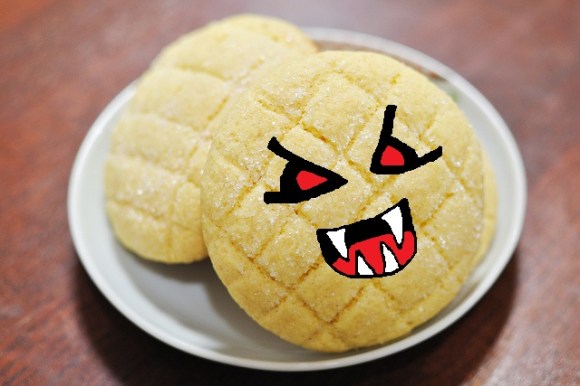
If you’re munching on some melon bread right now, you may want to put that thing down.
Melon bread is awesome. Anyone who has ever been to a Japanese convenience store before in need of a quick breakfast or afternoon snack knows that the soft, sweet melon-y bread has no equal when it comes to pure deliciousness.
But all of that tasty goodness comes at a price. If you thought melon bread was just some warm, fluff bread baked with a dash of farm fresh melon, then think again.
According to Japanese nutritionists, melon bread is an “extremely unhealthy food,” even more so than the average sweet snack. There are several reasons for this, but one of the most important is melon bread’s high level of aluminum.
▼ Injesting too much aluminum can lead to liver, kidney, bladder malfunction,
and a giant melon bread slamming into the Earth.
直径10kmの巨大メロンパンが地球に衝突すると、多くの生命が絶滅する。#メロンパンは危険 pic.twitter.com/TvDciOxJ50
— メロンパン (@melonpan_japan) September 13, 2016
Aluminum is found in small quantities in many foods, but is especially high in melon bread. In order to achieve the crispy, cookie outer shell of the bread, bakers use baking powder which has aluminum sulfate in it, making melon “bread” more like melon “cake/donut.”
Now, all this finger-pointing at melon bread may seem unfair. It’s just another unhealthy snack. As long as you’re not eating it every day, who cares? Right?
Unfortunately, that’s exactly what’s happening. In 2011 to 2012, the Japanese Ministry of Health carried out an investigation on melon bread, precisely because of the fact that the number of parents who were too busy to make breakfasts or lunches for their kids and just gave them melon bread instead was increasing dramatically.
Parents usually wouldn’t give their kids cake or donuts for breakfast and lunch every day, but melon bread’s labeling as a “bread” led many to do just that.
▼ Melon bread – a complete breakfast that satisfies all four food groups:
anime, rainbow, kawaii, and oOOoiiishiiiiii.
But high aluminum levels are only the beginning of melon bread’s unhealthiness. Since there’s not actually any melon in the bread at all (the bread gets its name from merely looking like a melon), additives and artificial flavors are used to achieve melon bread’s trademark taste. Specifically it uses Blue 1 (connected to kidney tumors) and lecithin emulcifiers (which can damage intestines).
But wait! There’s more!
When it comes to just straight up nutrition facts, melon bread is fairly horrendous. The average bun contains somewhere around 400 to 500 calories (a quarter of your daily calories gone in five bites), and those calories are made up entirely of sugar and fat with virtually no vitamins, protein, or fiber to speak of.
Eating melon bread regularly would not just lead to worse health, but could lead to diabetes, high cholesterol, and even osteoporosis due to the high sugar levels eating away at the body’s calcium.
▼ Mmm… tastes like future misery!
秋のマロンパンのシーズン到来(これはメロンパン)
— でじ (@z_tanaman11) September 2, 2016
@0m5m1m8 #ポートレート #被写体募集 #被写体 #写真好きな人と繋がりたい#被写体さんと繋がりたい#portrait pic.twitter.com/jFEq4ypO8X
Of course, the most important takeaway here is that – like all things – melon bread should be enjoyed in moderation. Even Japanese nutritionists agree that one melon bread every two weeks shouldn’t cause any damage, it’s just when it’s consumed on a regular basis that dietary action should be taken.
Here’s how Japanese netizens reacted to their melon bread dreams being crushed:
“Crap… now I have a horrible craving for melon bread!”
“I knew melon bread wasn’t that great, but geez.”
“Obviously. Anything is bad if you have too much of it. News flash: if you drink a whole bottle of soy sauce you’ll die.”
“Melon bread! How could you betray me like this?!”
Don’t worry friends, we have a plan. What if we put a big slab of healthy cheese on the melon bread? That would make it better, right?
Source: Excite News via My Game News Flash
References: Mercola.com, The Conversation
Featured/top image: Flick/yoppy (edited by RocketNews24)

 Japan’s new Melon Pan slices: Simply pop them on bread and heat and eat
Japan’s new Melon Pan slices: Simply pop them on bread and heat and eat Less is more as bakery starts selling bags of delicious melon bread crusts minus the bread
Less is more as bakery starts selling bags of delicious melon bread crusts minus the bread New spreadable melon pan changes the way we eat toast in Japan
New spreadable melon pan changes the way we eat toast in Japan In search of Japan’s largest melon bread with Mr. Sato
In search of Japan’s largest melon bread with Mr. Sato Melon bread showdown! Which Japanese convenience store melon pan is the one for you?【Taste test】
Melon bread showdown! Which Japanese convenience store melon pan is the one for you?【Taste test】 Starbucks Japan releases first-ever Hinamatsuri Girls’ Day Frappuccino
Starbucks Japan releases first-ever Hinamatsuri Girls’ Day Frappuccino Japan Extreme Budget Travel! A trip from Tokyo to Izumo for just 30,000 yen [Part 2]
Japan Extreme Budget Travel! A trip from Tokyo to Izumo for just 30,000 yen [Part 2] Tokyo street sweets: The must-snack treats of Nakano’s Refutei
Tokyo street sweets: The must-snack treats of Nakano’s Refutei Japanese restaurant chain serves Dragon Ball donuts and Senzu Beans this spring
Japanese restaurant chain serves Dragon Ball donuts and Senzu Beans this spring Which convenience store onigiri rice balls are the most popular? Survey reveals surprising results
Which convenience store onigiri rice balls are the most popular? Survey reveals surprising results Drift ice in Japan is a disappearing winter miracle you need to see now
Drift ice in Japan is a disappearing winter miracle you need to see now Japan has a new bar just for people thinking about quitting their jobs, and the drinks are free
Japan has a new bar just for people thinking about quitting their jobs, and the drinks are free 7-Eleven Japan’s sakura sweets season is underway right now!
7-Eleven Japan’s sakura sweets season is underway right now! Yakiniku Like in Tokyo starts serving up solo shabu shabu hot pot, and we tried it
Yakiniku Like in Tokyo starts serving up solo shabu shabu hot pot, and we tried it Japanese beauty trends of the 20th & 21st centuries, and predicting future fashions
Japanese beauty trends of the 20th & 21st centuries, and predicting future fashions Highest Starbucks in Japan set to open this spring in the Tokyo sky
Highest Starbucks in Japan set to open this spring in the Tokyo sky The 10 most annoying things foreign tourists do on Japanese trains, according to locals
The 10 most annoying things foreign tourists do on Japanese trains, according to locals Tokyo Skytree turns pink for the cherry blossom season
Tokyo Skytree turns pink for the cherry blossom season Yakuzen ramen restaurant in Tokyo is very different to a yakuza ramen restaurant
Yakuzen ramen restaurant in Tokyo is very different to a yakuza ramen restaurant Shibuya Station’s Hachiko Gate and Yamanote Line stairway locations change next month
Shibuya Station’s Hachiko Gate and Yamanote Line stairway locations change next month Starbucks Japan releases new sakura goods and drinkware for cherry blossom season 2026
Starbucks Japan releases new sakura goods and drinkware for cherry blossom season 2026 Starbucks Japan adds new sakura Frappuccino and cherry blossom drinks to the menu
Starbucks Japan adds new sakura Frappuccino and cherry blossom drinks to the menu Japan Extreme Budget Travel! A trip from Tokyo to Izumo for just 30,000 yen [Part 1]
Japan Extreme Budget Travel! A trip from Tokyo to Izumo for just 30,000 yen [Part 1] Japan’s new “Cunte” contact lenses aren’t pronounced like you’re probably thinking they are
Japan’s new “Cunte” contact lenses aren’t pronounced like you’re probably thinking they are Japan’s newest Shinkansen has no seats…or passengers [Video]
Japan’s newest Shinkansen has no seats…or passengers [Video] Foreigners accounting for over 80 percent of off-course skiers needing rescue in Japan’s Hokkaido
Foreigners accounting for over 80 percent of off-course skiers needing rescue in Japan’s Hokkaido Super-salty pizza sends six kids to the hospital in Japan, linguistics blamed
Super-salty pizza sends six kids to the hospital in Japan, linguistics blamed Starbucks Japan unveils new sakura Frappuccino for cherry blossom season 2026
Starbucks Japan unveils new sakura Frappuccino for cherry blossom season 2026 Foreign tourists in Japan will get free Shinkansen tickets to promote regional tourism
Foreign tourists in Japan will get free Shinkansen tickets to promote regional tourism Take a trip to Japan’s Dododo Land, the most irritating place on Earth
Take a trip to Japan’s Dododo Land, the most irritating place on Earth Naruto and Converse team up for new line of shinobi sneakers[Photos]
Naruto and Converse team up for new line of shinobi sneakers[Photos] Is China’s don’t-go-to-Japan warning affecting the lines at a popular Tokyo gyukatsu restaurant?
Is China’s don’t-go-to-Japan warning affecting the lines at a popular Tokyo gyukatsu restaurant? Survey asks foreign tourists what bothered them in Japan, more than half gave same answer
Survey asks foreign tourists what bothered them in Japan, more than half gave same answer Japan’s human washing machines will go on sale to general public, demos to be held in Tokyo
Japan’s human washing machines will go on sale to general public, demos to be held in Tokyo Starbucks Japan releases new drinkware and goods for Valentine’s Day
Starbucks Japan releases new drinkware and goods for Valentine’s Day We deeply regret going into this tunnel on our walk in the mountains of Japan
We deeply regret going into this tunnel on our walk in the mountains of Japan Studio Ghibli releases Kodama forest spirits from Princess Mononoke to light up your home
Studio Ghibli releases Kodama forest spirits from Princess Mononoke to light up your home Major Japanese hotel chain says reservations via overseas booking sites may not be valid
Major Japanese hotel chain says reservations via overseas booking sites may not be valid Put sesame oil in your coffee? Japanese maker says it’s the best way to start your day【Taste test】
Put sesame oil in your coffee? Japanese maker says it’s the best way to start your day【Taste test】 No more using real katana for tourism activities, Japan’s National Police Agency says
No more using real katana for tourism activities, Japan’s National Police Agency says What’s the difference between Hong Kong pineapple bun and Japanese melon bread?
What’s the difference between Hong Kong pineapple bun and Japanese melon bread? Let’s try all the melon bread types sold by Japanese convenience store Family Mart【Taste test】
Let’s try all the melon bread types sold by Japanese convenience store Family Mart【Taste test】 The double-cheese-mayonnaise-melon-bread is a mouthful in more ways than one
The double-cheese-mayonnaise-melon-bread is a mouthful in more ways than one How to make Japanese melon pan out of any type of bread
How to make Japanese melon pan out of any type of bread Melon bread…with meat? A crazy new twist on one of Japan’s favorite baked goods【Taste test】
Melon bread…with meat? A crazy new twist on one of Japan’s favorite baked goods【Taste test】 What kind of magic happens when you put Japanese combini pastries into a hot sandwich maker?
What kind of magic happens when you put Japanese combini pastries into a hot sandwich maker? We go crazy for 500 yen all-you-can-eat sweets and snacks at Tokyo Dagashi Bar
We go crazy for 500 yen all-you-can-eat sweets and snacks at Tokyo Dagashi Bar